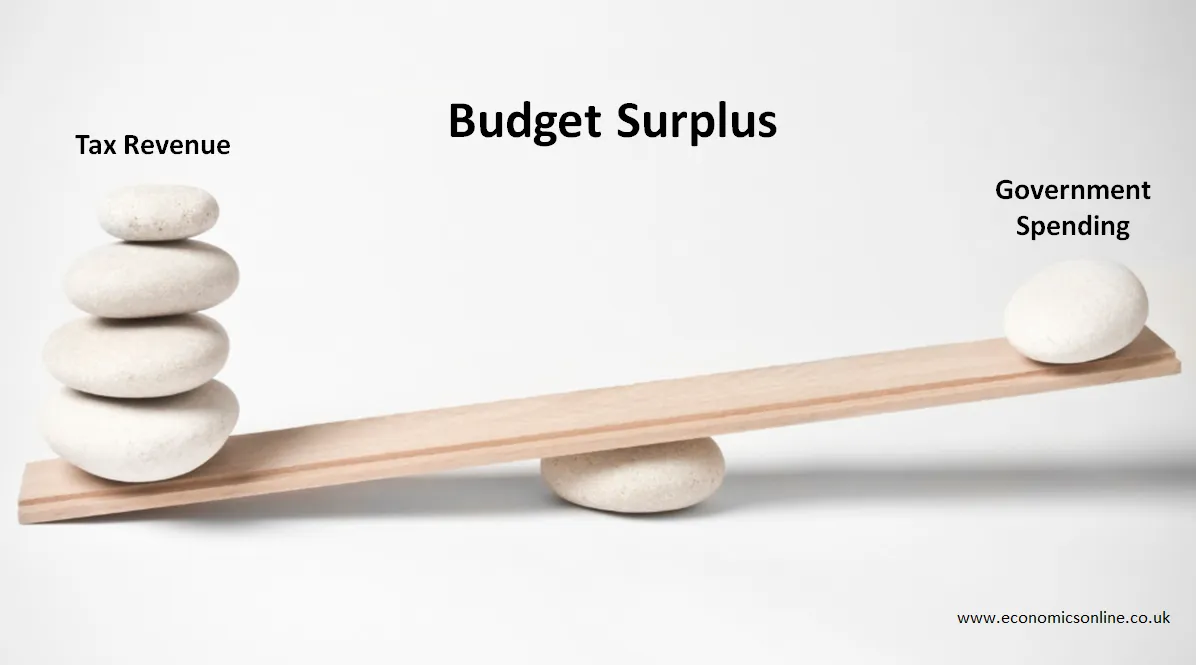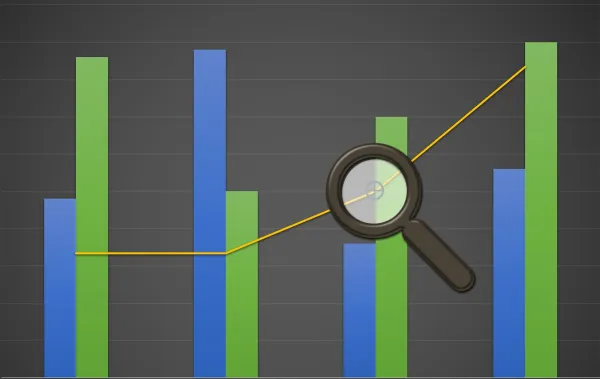
An image showing a scale.
Budget Surplus Definition
What is a Budget Surplus?
Budget surplus occurs when government’s tax revenue is more than government spending.
In other words, in a budget surplus, a government has more money coming in than going out, which results in a positive balance at the end of a fiscal year. It also means that the government income is greater than its spending.
Explanation
Let us define a few basic terms to better understand the concept of budget surplus.
The government budget is the difference between the government’s tax revenue and its spending.
Its formula is
Government Budget = Tax Revenue – Government Spending
When tax revenue is greater than government spending, the government budget is positive, and it is called the budget surplus.

When tax revenue is less than government spending, the government budget is negative, and it is called the budget deficit. In times of government budget deficits, governments impose higher taxes and reduce government spending.
When tax revenue is equal to government spending, the government budget is zero, and it is called the balanced budget.
Reasons behind a Government Budget Surplus
The following are the main reasons why a government may have a budget surplus:
Higher Tax Revenue
When a government's tax revenue is high due to economic growth or tax reforms, it can result in a budget surplus.
Low Government Spending
When a government decreases its spending, it can result in a budget surplus. For example, when a government decides to decrease the number of government employees, it can lead to cost savings, resulting in a budget surplus.
Effects of Budget Surplus on the Economy
Budget surplus is an important concept in economics. A government budget surplus can have several positive effects on the economy. Here are some of them:
Economic Stability
A budget surplus can lead to greater economic stability. When governments have surplus funds, they can invest them in public goods to boost economic growth and create employment opportunities. This could lead to higher GDP, lower inflation, lower unemployment, and a more stable economy.
Lower Interest Rates
If a government has surplus funds, it can use them to pay off its debts. This could lead to lower interest rates, benefiting both consumers and firms. Low interest rates can lead to higher consumption and more borrowing and investment, which can boost economic growth.
Higher Confidence
A budget surplus can send a positive signal to investors, firms, and consumers. This shows that the government is financially strong and is managing its funds in a better way. This could increase overall confidence in the economy, leading to more investment and hence economic growth.
Advantages of Budget Surplus
When a government operates a budget surplus, it has surplus money that can be used to create many positive effects for the economy.
1. Economic Growth
When a government runs a budget surplus, surplus funds can be used to build infrastructure and other public goods that can fuel economic growth. For example, the government can invest its surplus funds in building new roads, hospitals, bridges, and public transport. These investments can create jobs and economic growth, which benefit not only the private sector firms but also everyone in the economy.
2. Debt Reduction
The government can reduce its existing debt by using funds from its budget surplus. When government debt is reduced, this can lead to lower interest payments and free up resources for other uses. Reducing the debt burden can also lead to higher credit ratings; lower borrowing costs, and an overall better business environment.
3. Emergency Fund
A budget surplus can also be used as an emergency fund for contingencies. For instance, natural disasters can lead to unexpected expenses, and surplus funds can help the government respond quickly to these calamities.
4. Future Planning
A budget surplus can also be used for future planning. Governments can invest surplus funds in research and development or to build a more sustainable economy. In this way, the economy will be better prepared for any future challenges.
Disadvantages of Budget Surplus
A budget surplus may have some drawbacks too.
1. Decreased Government Spending
A budget surplus can lead to decreased government spending. While this can result in lower taxation and higher economic growth, it can also lead to less spending on public goods and infrastructure.
2. Decreased Economic Activity
Governments normally operate budget surpluses to slow down the economy through increased tax rates and reduced government spending. This can create a fall in aggregate demand, which can lead to unemployment and decreased consumer spending.
3. Inflation
The use of surplus funds by the government to increase its spending can lead to inflation, which can result in higher price level of goods and services in the economy.
When should a government operate a budget surplus?
A budget surplus is suitable when the growth rate of the economy is high. Operating a budget surplus is the part of contrationary fiscal policy which will slow down the overheating economy and inflation will also be controlled.
Conclusion
A budget surplus occurs when the government has more revenue than it is spending. A budget surplus can have advantages and disadvantages for the economy. Hence, governments should carefully consider its advantages and disadvantages before taking the decision to operate a budget surplus.


